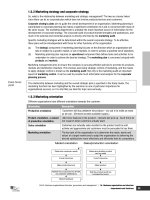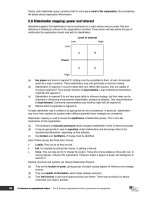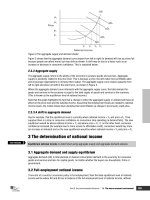ACCA Paper F6 doc
Bạn đang xem bản rút gọn của tài liệu. Xem và tải ngay bản đầy đủ của tài liệu tại đây (7.16 MB, 465 trang )
S
T
U
D
Y
T
E
X
T
TAXATION (UK)
FA 2010 and F (No.2)A 2010
BPP Learning Media is the sole ACCA Platinum Approved Learning Partner – content
for the ACCA qualification. In this, the only Paper F6 study text to be reviewed by the
examiner:
• We discuss the best strategies for studying for ACCA exams
• We highlight the most important elements in the syllabus and the key skills you will need
• We signpost how each chapter links to the syllabus and the study guide
• We provide lots of exam focus points demonstrating what the examiner will want you to do
• We emphasise key points in regular fast forward summaries
• We test your knowledge of what you've studied in quick quizzes
• We examine your understanding in our exam question bank
• We reference all the important topics in our full index
BPP's i-Pass and i-Learn products also support this paper.
FOR EXAMS IN JUNE AND DECEMBER 2011
ii
First edition March 2007
Fifth edition November 2010
Printed text ISBN 9780 7517 9417 5
(Previous ISBN 9780 7517 6368 3)
e text ISBN 9780 7517 8687 3
British Library Cataloguing-in-Publication Data
A catalogue record for this book
is available from the British Library
Published by
BPP Learning Media Ltd
BPP House, Aldine Place
London W12 8AA
www.bpp.com/learningmedia
Printed in the United Kingdom
Your learning materials, published by BPP
Learning Media Ltd, are printed on paper
sourced from sustainable, managed forests.
All our rights reserved. No part of this publication may be
reproduced, stored in a retrieval system or transmitted, in
any form or by any means, electronic, mechanical,
photocopying, recording or otherwise, without the prior
written permission of BPP Learning Media Ltd.
We are grateful to the Association of Chartered Certified
Accountants for permission to reproduce past
examination questions. The suggested solutions in the
exam answer bank have been prepared by BPP Learning
Media Ltd, unless otherwise stated.
©
BPP Learning Media Ltd
2010
Contents
iii
Contents
Page
Introduction
Helping you to pass – the ONLY F6 Study Text reviewed by the examiner! vii
Studying F6 ix
The exam paper x
Part A UK tax system
1 Introduction to the UK tax system 3
Part B Income tax and national insurance contributions
2 The computation of taxable income and the income tax liability 15
3 Employment income 33
4 Taxable and exempt benefits. The PAYE system 43
5 Pensions 63
6 Property income 71
7 Computing trading income 79
8 Capital allowances 91
9 Assessable trading income 113
10 Trading losses 127
11 Partnerships and limited liability partnerships 141
12 National insurance contributions 151
Part C Chargeable gains for individuals
13 Computing chargeable gains 161
14 Chattels and the principal private residence exemption 173
15 Business reliefs 183
16 Shares and securities 195
Part D Tax administration for individuals
17 Self assessment and payment of tax by individuals 207
Part E Inheritance tax
18 Inheritance tax: scope and transfers of value 227
Part F Corporation tax
19 Computing taxable total profits 249
20 Computing the corporation tax liability 259
21 Chargeable gains for companies 269
22 Losses 279
23 Groups 291
24 Overseas matters for companies 301
25 Self assessment and payment of tax by companies 309
Part G Value added tax
26 An introduction to VAT 321
27 Further aspects of VAT 341
iv
Exam question and answer bank
355
Tax tables
425
Index
431
Review form and free prize draw
Contents
v
A note about copyright
Dear Customer
What does the little © mean and why does it matter?
Your market-leading BPP books, course materials and e-learning materials do not write and update
themselves. People write them: on their own behalf or as employees of an organisation that invests in this
activity. Copyright law protects their livelihoods. It does so by creating rights over the use of the content.
Breach of copyright is a form of theft – as well as being a criminal offence in some jurisdictions, it is
potentially a serious breach of professional ethics.
With current technology, things might seem a bit hazy but, basically, without the express permission of
BPP Learning Media:
• Photocopying our materials is a breach of copyright
• Scanning, ripcasting or conversion of our digital materials into different file formats, uploading
them to facebook or emailing them to your friends is a breach of copyright
You can, of course, sell your books, in the form in which you have bought them – once you have finished
with them. (Is this fair to your fellow students? We update for a reason.) But the e-products are sold on a
single user licence basis: we do not supply ‘unlock’ codes to people who have bought them second hand.
And what about outside the UK? BPP Learning Media strives to make our materials available at prices
students can afford by local printing arrangements, pricing policies and partnerships which are clearly
listed on our website. A tiny minority ignore this and indulge in criminal activity by illegally photocopying
our material or supporting organisations that do. If they act illegally and unethically in one area, can you
really trust them?
vi
Introduction
vii
Helping you to pass – the ONLY F6 Study Text reviewed
by the examiner!
BPP Learning Media – the sole Platinum
Approved Learning Partner - content
As ACCA’s sole Platinum Approved Learning Partner – content, BPP Learning Media gives you the
unique opportunity to use examiner-reviewed study materials for the 2011 exams. By incorporating the
examiner’s comments and suggestions regarding the depth and breadth of syllabus coverage, the BPP
Learning Media Study Text provides excellent, ACCA-approved support for your studies.
The PER alert!
Before you can qualify as an ACCA member, you do not only have to pass all your exams but also fulfil a
three year practical experience requirement (PER). To help you to recognise areas of the syllabus that
you might be able to apply in the workplace to achieve different performance objectives, we have
introduced the ‘PER alert’ feature. You will find this feature throughout the Study Text to remind you that
what you are learning to pass your ACCA exams is equally useful to the fulfilment of the PER
requirement.
Tackling studying
Studying can be a daunting prospect, particularly when you have lots of other commitments. The
different features of the text, the purposes of which are explained fully on the Chapter features page, will
help you whilst studying and improve your chances of exam success.
Developing exam awareness
Our Texts are completely focused on helping you pass your exam.
Our advice on Studying F6 outlines the content of the paper, the necessary skills the examiner expects
you to demonstrate and any brought forward knowledge you are expected to have.
Exam focus points are included within the chapters to highlight when and how specific topics were
examined, or how they might be examined in the future.
Using the Syllabus and Study Guide
You can find the syllabus and Study Guide on page xiii of this Study Text
Testing what you can do
Testing yourself helps you develop the skills you need to pass the exam and also confirms that you can
recall what you have learnt.
We include Questions – lots of them – both within chapters and in the Exam Question Bank, as well as
Quick Quizzes at the end of each chapter to test your knowledge of the chapter content.
viii
Introduction
Chapter features
Each chapter contains a number of helpful features to guide you through each topic.
Topic list
Topic list Syllabus reference
Tells you what you will be studying in this chapter and the
relevant section numbers, together the ACCA syllabus
references.
Introduction
Puts the chapter content in the context of the syllabus as
a whole.
Study Guide
Links the chapter content with ACCA guidance.
Exam Guide
Highlights how examinable the chapter content is likely to
be and the ways in which it could be examined.
Summarises the content of main chapter headings,
allowing you to preview and review each section easily.
Examples
Demonstrate how to apply key knowledge and
techniques.
Key terms
Definitions of important concepts that can often earn you
easy marks in exams.
Exam focus points
Tell you when and how specific topics were examined, or
how they may be examined in the future.
This is a new feature that gives you a useful indication of
syllabus areas that closely relate to performance
objectives in your Practical Experience Requirement
(PER).
Question
Give you essential practice of techniques covered in the
chapter.
Chapter Roundup
A full list of the Fast Forwards included in the chapter,
providing an easy source of review.
Quick Quiz
A quick test of your knowledge of the main topics in the
chapter.
Exam Question Bank
Found at the back of the Study Text with more
comprehensive chapter questions. Cross referenced for
easy navigation.
FA
S
T F
O
RWAR
D
Introduction
ix
Studying F6
As the name suggests, this paper examines the basic principles of taxation. This is a very important area
for certified accountants as many areas of practice involve a consideration of taxation issues. It also
provides a foundation for P6: Advanced Taxation which will be chosen by those who work in a tax
environment.
The F6 examiner
The examiner for this paper is David Harrowven. He has been the examiner for this paper since 2007 and
a tax examiner with the ACCA since 1991. The examiner is looking for students to show that they have a
solid understanding of the UK tax system and the main taxes which are income tax, corporation tax,
national insurance contributions, capital gains tax, inheritance tax and value added tax. Mr Harrowven has
written several articles in Student Accountant, including one on how to approach the paper (November
2006 issue), two on Inheritance Tax (October and November 2010 issues) and on Finance Act 2010 and
Finance (No.2) Act 2010 (September 2010 issue). Make sure you read these articles to gain further
insight into what the examiner is looking for.
Syllabus update
The F6 syllabus has been updated for the June 2011 sitting onwards. The full syllabus and study guide
can be found in this Study Text on pages xiii to xxv. The main changes are the inclusion of the basic
principles of Inheritance Tax and two new VAT topics – group registration and overseas aspects. The
approach to examining the syllabus has also changed with Question 3 on chargeable gains being reduced
to 15 marks and Question 5 being increased to 15 marks.
A full summary of the changes to the F6 syllabus is given below
x
Introduction
Introduction
xi
1 What F6 is about
The UK tax system
The syllabus introduces the rationale behind – and the functions of – the tax system.
The taxes
It then covers the main UK taxes which apply to individuals and businesses.
Income tax and corporation tax cover the widest areas of the syllabus, forming the basis for questions 1
and 2 totalling 55% of the marks. Value added tax (VAT) is likely to be covered in one of these questions,
in which case at least 10 of the 55 marks will be awarded for VAT, although it is possible that a separate
question on VAT will be included instead. Chargeable gains (either personal or corporate) will be covered
in question 3, for which 15 marks will be available. Inheritance tax could be examined in either of
questions 4 or 5 for a maximum of 15 marks. National insurance may be examined in any question on
income tax or corporation tax.
You will be expected to have a detailed knowledge of these taxes, but no previous knowledge is assumed.
You should study the basics carefully and learn the proforma computations. It then becomes
straightforward to complete these by slotting in figures from your detailed workings.
As well as being able to calculate tax liabilities you will be expected to explain the basis of the calculations
and how a taxpayer can minimise or defer tax liabilities
Compliance
The final part of the syllabus covers the compliance obligations of the taxpayer. Although not a major part
of the syllabus it is likely to form an element in one or more questions in the exam. A knowledge of tax is
incomplete without an understanding of how the tax is collected.
2 What skills are required?
• Be able to integrate knowledge and understanding from across the syllabus to enable you to
complete detailed computations of tax liabilities.
• Be able to explain the underlying principles of taxation by providing a simple summary of the rules
and how they apply to the particular situation.
• Be able to apply tax planning techniques by identifying available options and testing them to see
which has the greater effect on tax liabilities.
3 How to improve your chances of passing
Study the entire syllabus – all the questions in the exam are compulsory. This gives the examiner the
opportunity to test all major areas of the syllabus on every paper.
Practise as many questions as you can under timed conditions – this is the best way of developing good
exam technique. Make use of the Question Bank at the back of this Text. BPP's Practice and Revision Kit
contains numerous exam standard questions (many of them taken from past exam papers) as well as
three mock exams for you to try.
Answer selectively – the examiner will expect you to consider carefully what is relevant and significant
enough to include in your answer. Don't include unnecessary information.
Present your answers in a professional manner – use subheadings and leave spaces between paragraphs,
make sure that your numerical workings are clearly set out. Even if you make a mistake in your
calculations, you will still gain marks if you show that you understand the principles involved.
Answer all parts of the question – leaving out a five mark part may be the difference between a pass and a
fail.
xii
Introduction
The exam paper
The syllabus is assessed by a paper-based examination. The time allowed is 3 hours with 15 minutes
reading and planning time.
The paper will be predominantly computational and will have five questions, all of which will be
compulsory.
• Question one will focus on income tax and question two will focus on corporation tax. The two
questions will be for a total of 55 marks, with one of the questions being for 30 marks and the
other being for 25 marks. Questions one or two might include a small element of chargeable
gains.
• Question three will focus on chargeable gains (either personal or corporate) and will be for 15
marks.
• Questions four and five will be on any area of the syllabus, can cover more than one topic
(including inheritance tax), and will be for 15 marks each.
There will always be at a minimum of 10 marks on value added tax. These marks will normally be
included within question one or question two, although there might be a separate question on value added
tax. National insurance contributions will not be examined as a separate question, but may be
examined in any question involving income tax or corporation tax. Groups and overseas aspects of
corporation tax may be examined in either question two or question five. Inheritance tax could be
examined in questions four or five for a maximum of 15 marks.
Any of the five questions might include the consideration of issues relating to the minimisation or
deferral of tax liabilities.
Introduction
xiii
Syllabus and Study Guide
The F6 syllabus and study guide can be found below.
xiv
Introduction
Introduction
xv
xvi
Introduction
Introduction
xvii
xviii
Introduction
Introduction
xix
xx
Introduction
Introduction
xxi
xxii
Introduction
Introduction
xxiii
xxiv
Introduction









